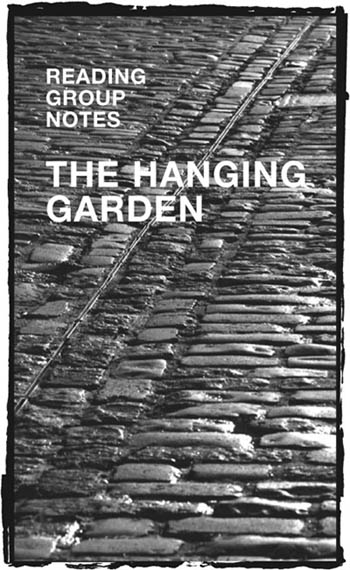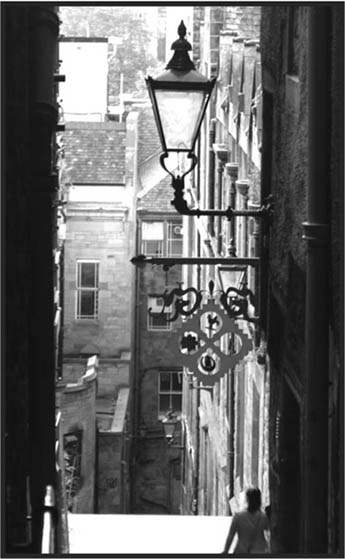The Hanging Garden (45 page)
Read The Hanging Garden Online
Authors: Ian Rankin

Rebus wondered if there’d be any turning back.
They stopped at the gates to a warehouse complex. The driver undid the padlock, pulled the chain free. The gates swung open. In they went. The Weasel ordered the driver to park around the back. There was a plain white van there, more rust than metal. Its back windows had been painted over, turning it into a suitable hearse should occasion demand.
They got out into a salt wind. The Weasel shuffled over towards a door and banged once. The door was pushed open from within. They stepped inside.
A huge open space, filled with only a few packing cases, a couple of pieces of machinery covered with oil-cloth. And two men: the one who’d let them in, and another at the far end. This man was standing in front of a wooden chair. There was a figure tied to the chair, half-hidden by the man. The Weasel led the procession. Rebus tried to control his breathing, which was growing painfully shallow. His heart was racing, nerves jangling. He pushed back the anger, wasn’t sure he could hold it.
When they were eight feet from the chair, the Weasel nodded and the man stood away, revealing to Rebus the terrified figure of a kid.
A boy.
Nine or ten, no older.
One black eye, nose caked with blood, both cheeks bruised and a graze on his chin. Burst lip beginning to heal, trousers torn at the knees, one shoe missing.
And a smell, as if he’d wet himself, maybe even worse.
‘What the hell is this?’ Rebus asked.
‘This,’ the Weasel said, ‘is the little bastard who stole the car. This is the little bastard who lost his nerve at a red light and gunned through it, losing control of the pedals because he could barely reach them. This ...’ The Weasel stepped forward, planted a hand on the kid’s shoulder. ‘This is the culprit.’
Rebus looked at the faces around him. ‘Is this your idea of a joke?’
‘No joke, Rebus.’
He looked at the boy. Dried tear-tracks. Eyes bloodshot from crying. Shoulders trembling. They’d tied his arms behind him. Tied his ankles to the chair-legs.
‘Puh-please, mister ...’ Dry, cracked voice. ‘I ... help me, puh-please ...’
‘Nicked the car,’ the Weasel recited, ‘then did the hit and run, got scared, and dumped the car near where he lives. Took the cassette and the tapes. He wanted the car for a race. That’s what they do, race cars around the schemes. This little runt can start an engine in ten seconds flat.’ He rubbed his hands together. ‘So ... here we all are.’
‘Help me ...’
Rebus recalling the city’s graffiti: Won’t Anyone Help? The Weasel nodding towards one of his men, the man producing a pickaxe-handle.
‘Or the screwdriver,’ the Weasel said. ‘Or whatever you like, really. We are at your command.’ And he gave a little bow.
Rebus could hardly speak. ‘Cut the ropes.’
Silence in the warehouse.
‘
Cut those fucking ropes!
’
A sniff from the Weasel. ‘You heard the man, Tony.’
Ca-chink of a flick-knife opening. Ropes severed like cutting through butter. Rebus walked to within inches of the boy.
‘What’s your name?’
‘J-Jordan.’
‘Is that your first name or your second?’
The boy looked at him. ‘First.’
‘Okay, Jordan.’ Rebus leaned down. The boy flinched, but did not resist as Rebus picked him up. He weighed almost nothing. Rebus started walking with him.
‘What now, Rebus?’ the Weasel asked. But Rebus didn’t answer. He carried the boy to the threshold, kicked open the door, stepped out into sunshine.
‘I’m ... I’m really sorry.’ The boy had a hand across his eyes, unused to the light. He was starting to cry.
‘You know what you did?’
Jordan nodded. ‘I’ve been ... ever since that night. I knew it was bad ...’ Now the tears came.
‘Did they say who I was?’
‘Please don’t kill me.’
‘I’m not going to kill you, Jordan.’
The boy blinked, trying to clear tears from his eyes, the better to know whether he was being lied to.
‘I think you’ve been through enough, pal,’ Rebus said. Then added: ‘I think we both have.’
So after everything, it had come to this. Bob Dylan: ‘Simple Twist of Fate’. Segue to Leonard Cohen: ‘Is This What You Wanted?’
Rebus didn’t know the answer to that.
Clean and sober, he went to the hospital. An open ward this time, set hours for visitors. No more darkened vigils. No return visit by Candice, though nurses spoke of regular phone calls by someone foreign-sounding. No way of knowing where she was. Maybe out there searching for her son. It didn’t matter, so long as she was safe. So long as she was in control.
When he reached the ward’s far end, two women rose from their chairs so he could kiss them: Rhona and Patience. He had a carrier-bag with him, magazines and grapes. Sammy was sitting up, supported by three pillows, Pa Broon propped beside her. Her hair had been washed and brushed, and she was smiling at him.
‘Women’s magazines,’ he said, shaking his head. ‘They should be on the top-shelf.’
‘I need a few fantasies to sustain me in here,’ Sammy said. Rebus beamed at her, said hello, then bent down and kissed his daughter.
The sun was shining as they walked through The Meadows – a rare day off for both. They held hands and watched people sunbathing and playing football. He knew Rhona was excited, and thought he knew why. But he wasn’t going to spoil things with speculation
.
‘
If you had a daughter, what would you call her?’ she asked
.
He shrugged. ‘Haven’t really thought about it
.’
‘
What about a son?
’
‘
I quite like Sam
.’
‘
Sam?
’
‘
When I was a kid, I had a bear called Sam. My mum knitted it for me
.’
‘
Sam
...”
She tried the name out. ‘It would work both ways, wouldn’t it?
’
He stopped, circled his arms around her waist. ‘How do you mean?
’
‘
Well, it could be Samuel or Samantha. You don’t get many of those – names that work both ways
.’
‘
I suppose not. Rhona, is there ...?
’
She put a finger to his lips, then kissed him. They walked on. There didn ‘t seem to be a cloud in the whole damned sky
.
My fictional French village of Villefranche d’Albarede owes its existence to the real village of Oradour-sur-Glâne, which was the subject of an attack by the 3rd Company of the SS ‘Der Führer’ regiment.
On the afternoon of Saturday 10 June 1944, 3rd Company – known as ‘Das Reich’ – entered the village and rounded up everyone. The women and children were herded into the church, while the men were split into groups and marched to various barns and other buildings around the village. Then the slaughter began.
Some 642 victims have been accounted for, but the estimate is that up to a thousand people may have perished that day. Only fifty-three corpses were ever identified. One boy from Lorraine, having first-hand knowledge of SS atrocities, managed to flee when the troops entered the village. Five men escaped the massacre in Laudy’s barn. Wounded, they were able to crawl from the burning building and hide until the next day. One woman escaped from the church, climbing out of a window after playing dead beside the corpse of her child.
Soldiers went from house to house, finding villagers too sick or elderly to leave their beds. These people were shot and their houses set alight. Some of the bodies were hidden in mass graves, or dumped down wells and in bread ovens.
General Lammerding was the commanding officer. On 9 June he’d ordered the deaths of ninety-nine hostages in Tulle. He also gave the order for the Oradour massacre.
Later on in the war, Lammerding was captured by the British, who refused his extradition to France. Instead, he was returned to Düsseldorf, where he ran a successful company until his death in 1971.
In the general euphoria of the Normandy landings, the tragedy at Oradour went almost unnoticed. Eventually, in January 1953, the trial opened in Bordeaux of sixty-five men identified as having been involved in the massacre. Of these sixty-five, only twenty-one were present: seven Germans, and fourteen natives of French Alsace. None of the men was of officer rank.
Every individual found guilty at the Bordeaux trial left court a free man. A special Act of Amnesty had been passed, in the interests of national unity. (People in Alsace were disgruntled that their countrymen had been picked out for condemnation.) Meantime, the Germans were said to have already served their terms.
As a result, Oradour broke off all relations with the French state, a rupture which lasted seventeen years.
In May 1983, a man stood trial in East Berlin, charged with having been a lieutenant in ‘Das Reich’ during the Oradour massacre. He admitted everything, and was sentenced to life imprisonment.
In June 1996, it was reported that around 12,000 foreign volunteers to the Waffen SS are still receiving pensions from the Federal German government. One of these pensioners, a former Obersturmbannführer, was a participant at Oradour ...
Oradour still stands as a shrine. The village has been left just the way it was on that day in June 1944.

 © Rankin
© RankinABOUT IAN RANKIN
Ian Rankin, OBE, writes a huge proportion of all the crime novels sold in the UK and has won numerous prizes, including in 2005 the Crime Writers’ Association Diamond Dagger. His work is available in over 30 languages, home sales of his books exceed one million copies a year, and several of the novels based around the character of Detective Inspector Rebus – his name meaning ‘enigmatic puzzle’ – have been successfully transferred to television.
 Introduction to DI John Rebus
Introduction to DI John RebusThe first novels to feature Rebus, a flawed but resolutely humane detective, were not an overnight sensation, and success took time to arrive. But the wait became a period that allowed Ian Rankin to come of age as a writer, and to develop Rebus into a thoroughly believable, flesh-and-blood character straddling both industrial and post-industrial Scotland; a gritty yet perceptive man coping with his own demons. As Rebus struggled to keep his relationship with daughter Sammy alive following his divorce, and to cope with the imprisonment of brother Michael, while all the time trying to strike a blow for morality against a fearsome array of sinners (some justified and some not), readers began to respond in their droves. Fans admired Ian Rankin’s re-creation of a picture-postcard Edinburgh with a vicious tooth-and-claw underbelly just a heartbeat away, his believable but at the same time complex plots and, best of all, Rebus as a conflicted man trying always to solve the unsolvable, and to do the right thing.
As the series progressed, Ian Rankin refused to shy away from contentious issues such as corruption in high places, paedophilia and illegal
immigration, combining his unique seal of tight plotting with a bleak realism, leavened with brooding humour.
In Rebus the reader is presented with a rich and constantly evolving portrait of a complex and troubled man, irrevocably tinged with the sense of being an outsider and, potentially, unable to escape being a ‘justified sinner’ himself. Rebus’s life is intricately related to his Scottish environs too, enriched by Ian Rankin’s attentive depiction of locations, and careful regard to Rebus’s favourite music, watering holes and books, as well as his often fraught relationships with colleagues and family. And so, alongside Rebus, the reader is taken on an often painful, sometimes hellish journey to the depths of human nature, always rooted in the minutiae of a very recognisable Scottish life.